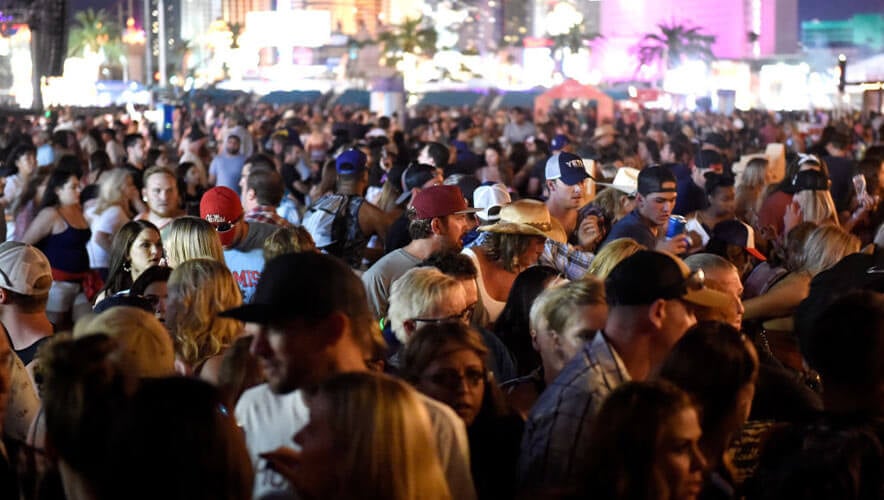Treating Trauma
All military personnel experience occupational stress. Sometimes, however, that stress continues after deployment or their period of service is completed, in what’s referred to as operational stress.
“To the majority of service personnel, an operational deployment is a positive experience, but there will be a number for whom experiences have some negative effects,” according to Land Forces Standing Order no. 3209, issued in June 2011. “Commanders at all levels must make every effort to limit the potential for psychological problems being suffered by their personnel and manage those who have been exposed to stressors.”
To help manage the mental and emotional well being of their troops after being deployed, British military leaders created a post-operational decompression program. When soldiers return from deployment, they may enter a formal, structured, monitored environment for three to four days to begin recovery before returning to their home bases.
They spend this time with the other soldiers they served with—with particular care paid to those from high-risk groups, such as those involved in counter-IED, search, and medical trauma personnel, as well as members of the chain of command.
“Post-operational decompression research is limited to qualitative data collection, nevertheless studies have reported overwhelming support for decompression, with over 90 percent of those studies finding it moderately or very useful, although it has been found that decompression may be less effective for units exposed to heavy combat,” according to the UK Ministry of Defense’s Defense People Mental Health and Wellbeing Strategy 2017-2022.
As part of their post-deployment care, service members are also offered counseling. But stigma associated with requesting or receiving mental health care means that some may not take up the offer. Instead, many may turn to alcohol, drugs, or other coping mechanisms to deal with the trauma they experienced during their service, says a former service member who spoke to Security Management on the condition of anonymity. We will call him Frank.
Frank did not drink alcohol, so he decided after his deployment to go to counseling but keep his decision to seek that help private.
“Personally, I didn’t feel the stigma, but as part of a group I would have. If the lads in my unit had known I was going, I’d have never lived it down,” he says. “And my father’s generation—you’re seen as less of a man if you talk to a counselor.”
Now, counseling is mandatory for individuals returning from active-duty service in the United Kingdom. Other military services have also increased their funding and efforts to provide mental health resources for service members—before, during, and after deployments.
But the same is not universally true for first responders and private security personnel, many of whom experience trauma on a regular basis while responding to fights, shootings, and other scenes of violence.
“I think we take for granted that law enforcement is psychologically prepared for what they might face, and focus so much more on them being trained and properly equipped to respond,” says Katherine Schweit, who founded Schweit Consulting LLC after a career as a Chicago prosecutor and an FBI special agent. “I don’t think that, historically, the United States has been at the forefront of preparing first responders mentally for the challenges they face.”
After the Sandy Hook elementary school shooting that killed 20 children and six adults, Schweit—then an FBI agent—was tapped to become part of a White House National Security Council violence prevention team. She worked to redevelop the FBI’s approach to active shooter incidents, as well as wrote the Bureau’s study of 160 active shooter incidents—the only review of its kind.
“One of the things we dealt with and I heard after Sandy Hook was a failure to recognize that law enforcement and first responders are also survivors and victims of an incident,” Schweit explains. “That was much less common 20 years ago, to think that an officer at all was a victim in a crime scene. Now we recognize that officers too suffer PTSD and other effects of seeing what they see and what they experience.”
The Effects of Trauma
When people experience a horrific event—a natural disaster, a car crash, a shooting, a death of a loved one—their body issues an emotional response known as trauma. This can have lasting, adverse effects on people’s mental, physical, and emotional health, as well as their social and spiritual wellbeing. And it’s not uncommon for people to experience shock and denial, leading to unpredictable emotions, flashbacks, strained relationships, or even physical symptoms like nausea and headaches, according to the American Psychological Association.
Many people will recover from these symptoms with time, but others may continue to experience them through prolonged flashbacks, bad dreams, frightening thoughts, avoiding places or feelings that remind them of the traumatic experience, being easily startled, experiencing angry outbursts, distorting feelings, or losing interest in activities previously enjoyed. When these symptoms persist, a psychiatrist or psychologist may diagnose the individual with post-traumatic stress disorder (PTSD).
PTSD is an anxiety disorder, says clinical and forensic psychologist Stephanie Leite, adding that different people experience different symptoms.
“It’s like your body doesn’t understand the threat is gone,” she says of people experiencing PTSD. “The saber-toothed tiger is in the room, scaring the pants off you while you’re taking a test. You’re having that trauma response at an inappropriate time.”
We take for granted that law enforcement is psychologically prepared for what they might face.
But not everyone needs to experience a tragic event to develop PTSD. In some instances, the act of preventing an incident can create similar stressors and responses, says Leite, who regularly works with school resource officers (SROs) as part of her practice.
“This one SRO I work with did an investigation on a student who had planned a school shooting,” Leite says. “It wasn’t until the SRO had achieved a mass of information that people took him seriously. He was so relieved that this kid was put in a treatment facility. But then they were released, and he had to be the point person for reintegrating them back into the school.”
That level of responsibility created a great deal of strain and stress in the SRO’s life, and he did not always receive support to carry it, Leite adds.
Women are more likely to experience PTSD than men, and the National Institute of Mental Health (NIMH) has identified other factors that might increase the risk of PTSD: living through dangerous events and traumas, getting hurt, seeing another person injured or a dead body, childhood trauma, and feelings of horror or hopelessness. Dealing with extra stress when an event occurs, having a history of mental illness or substance abuse, or receiving little or no social support after the event can also increase the likelihood of developing PTSD.
Individuals who have experienced combat and first responders are also at a heightened risk for experiencing trauma and PTSD.
Some law enforcement academies spend time on the psychological aspects of what an individual might go through when responding to a scene, but Schweit says she is doubtful many spend a lot of time on the subject.
“Because of that, we might have officers arrive at the scene of a crime and it’s the first time they’ve felt the stress of seeing someone who is dead or a dead person who has half of their head blown off,” she adds. “And the visual aspect of it and the smells are things they might not have thought about while they were shooting at paper targets at the academy.”
To make it through processing the scene, completing an investigation, and doing their work, many may ignore the trauma they experienced only to have it resurface years later, Leite says.
“I’ve worked with and talked with many people involved in responding to Sandy Hook—it was one of the most devastating shootings to respond to because of the age of the kids,” Leite explains. “The trauma of the first responders was deep, and for many peaked many years later.”
They also had the “first tendency is to ignore and bury,” she adds. “Then, there were a lot of guys who turned to alcohol to avoid it and were forced to deal with it later.”
Treatment
After being diagnosed with PTSD, some individuals might be prescribed medication to treat symptoms of depression or sleep problems and nightmares. Others might be encouraged to seek psychotherapy—a form of talk therapy where an individual speaks with a mental health professional, performed one-on-one or in a group setting usually for six to 12 weeks.
One form of psychotherapy used to treat PTSD is called cognitive behavioral therapy (CBT), which might include exposure therapy—where individuals are gradually exposed to the trauma they faced in a safe way to cope with their feelings—or cognitive restructuring—where a therapist helps an individual make sense of bad memories.
“Many types of psychotherapy can help people with PTSD,” according to NIMH. “Some types target the symptoms of PTSD directly. Other therapies focus on social, family, or job-related problems. The doctor or therapist may combine different therapies depending on each person’s needs.”
Insurance policies and employers may cover the cost of these types of therapy for first responders and private security practitioners. Garry Bergin, CPP, commercial manager and security consultant for Manguard Plus, says his company’s insurance covers counseling for security officers who have experienced trauma on the job.
For instance, a man was killed in a park in Dublin, Ireland, and contracted security officers from Manguard were required to secure the scene until the police could arrive. Many of them sought counseling services after that incident, Bergin says.
You’re having that trauma response at an inappropriate time.
Following the Sandy Hook shooting, Schweit says that the U.S. Department of Justice (the department that oversees the FBI) provided overtime pay and psychological care for officers who responded to the scene.
But there is still a stigma for many associated with seeking mental health care or even discussing it. The American Psychiatry Association (APA) estimates that more than half of people with mental illness do not receive help for their disorders, often because people avoid or delay seeking treatment because of concerns about how they will be treated by others or that they will be fired. There are also cultural differences at play.
“Stigma around mental illness especially an issue in some diverse racial and ethnic communities, and it can be a major barrier to people from those cultures accessing mental health services,” the APA found. “For example, in some Asian cultures, seeking professional help for mental illness may be counter to cultural values of strong family, emotional restraint, and avoiding shame. Among some groups, including the African American community’s, distrust of the mental healthcare system can also be a barrier to seeking help.”
In the military, for instance, there is an “ubiquitous presence” of stigma related to mental health and associated care processes that can be higher during deployment, according to the UK Ministry of Defense (MOD). It recognizes this stigma as an organizational culture issue that is influenced by those in positions of responsibility.
“Wholehearted endorsement by the chain of command to open the dialogue on mental health and wellbeing is seen as vital in the encouragement of ‘taking the first step,’” the ministry wrote. “Tackling stigma is one of the highest priorities for MOD health promotion activity.”
These stigmas carry over into the security profession, which can result in security officers not coming forward about their mental health needs or practitioners perpetrating stereotypes discouraging mental health assistance.
“Mental wellness, training, and discussions are often considered somewhat of a stigma—that an officer might be weak if they are seeking any support or if we’re talking about touchy-feely things,” Schweit explains.
This is one reason why Leite recommends a treatment called eye movement desensitization and reprocessing (EMDR), which does not involve the same level of talking that psychotherapy does.
EMDR speeds up the body’s ability to process trauma by linking the right and left sides of the brain. This is done by having an individual talk about trauma in a specific way while a therapist moves an object—such as a lightbar or stick—that the individual’s eyes follow from left to right.
“It allows you to remember the event without the central nervous system response,” Leite says. “You still have the memory, but you don’t have the trauma response with it. It’s very focused. You choose an event, and do an event at a time…and it is not as touch-feely as other forms of therapy.”
EMDR was created 25 years ago and is now one of the trauma-focused recommended forms of therapy from the U.S. Department of Veterans Affairs.
Prevention
There are some factors that can help promote recovery after trauma and prevent PTSD. Those include seeking out support from other people, finding a support group after a traumatic event, learning to feel good about one’s actions in the face of danger, having a positive coping strategy, and being able to act and respond effectively despite feeling fear, according to NIMH.
“When you feel effective and useful at your job, and you’re making connections and a difference in the lives of kids who look to you for support and help, that’s as good as it gets,” Leite says. “That provides the meaning that is necessary for mental health.”
Part of the FBI Academy’s training seems to have adopted some of the NIMH prevention tactics. For instance, Schweit says the largest block of training she received during her academy experience was in ethics—even more so than firearms training, which was substantial.
“You spend a lot of time thinking through how you would deal with a situation, how you would respond,” Schweit explains of the ethics training. “It helps you be mentally prepared when you get to a scene. It gives you a solid foundation.”
That training foundation also creates confidence, which helps officers react and respond to traumatic situations—especially those in a life-or-death scenario.
“Good training gives you confidence, and I had great training to know what was legally permissible. I had great confidence—personally—in what I think is the right moral and ethical decision in my actions,” Schweit explains. “When you have a gun out and you might have to pull a trigger, that’s when your heart is beating fast and your eyes are wide open and you’re thinking, ‘Is this the right decision?’”
To help be sure in moments like that, Schweit says she was trained and continued to practice never arriving at a scene without all her equipment at hand and visualizing how it might be used.
“If you respond to a scene, you don’t respond passively,” she says. “As an agent, when I responded to a scene, I never took for granted that everything was fine and dandy. If I was responding to a bank robbery, I’d visualize what the response was going to look like and then act on it. That’s a training technique that helps officers before they arrive on scene and makes them mentally ready for whatever they are going to face.”
Mental wellness, training, and discussions are often considered somewhat of a stigma.
The FBI, however, is in a unique position as a federal law enforcement agency that has the time and resources to conduct rigorous training of recruits and ongoing training of agents. This is not a privilege that many smaller agencies and private security firms have.
“A lot of other departments, training is so expensive that oftentimes we only provide mental health and wellness support after an incident, not really thinking about how we want an officer to be mentally strong before,” Schweit says.
That might be beginning to change with the enactment of the Law Enforcement Mental Health and Wellness Act, which officially recognized that U.S. law enforcement agencies need support for their efforts to protect employees’ mental health and wellbeing. In October 2021, the U.S. Department of Justice announced $7 million in grants on behalf of the law to improve delivery of and access to mental health and wellness services for law enforcement.
There has also been increased recognition to support employees who experience vicarious trauma—such as individuals who review extremism or child sexual abuse materials as part of their work—through toolkits and shared resources from the Justice Department’s Office for Victims of Crime.
The grants and resources, however, are not generally available to private security practitioners. Instead, private initiatives continue to pave the way to address mental health needs of front-line officers. Mike Hurst, CPP, International Foundation for Protection Officers (IFPO) UK director, has been a key player in this effort, creating a mental health working group for ASIS International and launching Security Minds Matter with the Security Industry Association in September 2022.
Security Minds Matter aims to provide best practices on mental health and wellbeing, signposts for individuals and employers for additional support, resources such as toolkits and guidance, and stimulate conversation and debate on mental health for private security professionals.
“The private security industry plays an important role in keeping the public safe,” Hurst said in a statement on the launch of Security Minds Matter. “It is well documented that security operatives as part of their daily duties often experience verbal abuse, violent assaults, and, in some extreme cases, have been killed while carrying out their role. The negative impact of these experiences on the mental health and wellbeing of security operatives cannot be underestimated.”
In an interview with Security Management, Hurst, who is also the director and cofounder of HJA Consult, shares that he became passionate about advocating for mental health awareness after becoming more involved with IFPO and learning about instances where security officers were responding to calls to assist someone in a mental health crisis—including instances where individuals had committed suicide.
“Now these officers, who were not especially well paid, are not often trained to deal with these things and not trained on support in the aftermath,” Hurst says.
Some larger, more successful UK security companies may have their directors or executive staff attend mental health first aid training, he adds. But “we think this is a misnomer, because when you think of normal first aid—someone who has broken their arm or cut themselves, you can do something there and then. Put their arm in a sling, cuff and position. Give them CPR. It’s not the same for mental health. You can’t do something there and then.”
Hurst has also found that this additional training does not always trickle down to frontline personnel, who are the individuals most likely to experience first or second-hand trauma because of their line of work.
This is where initiatives, like Security Minds Matter, can play a role by providing free resources to the security community that are not contingent upon employer resources. The project is still in its initial phase—having held a workshop earlier this year with security practitioners—but Hurst says it intends to roll out resources and further guidance.
Additionally, there’s a broader discussion happening within the security community itself about the need for increased mental health support for individuals who are responsible for others’ safety. But more remains to be done, Schweit says.
“There’s no roadmap to providing the best psychological training, but I think we can do more to ensure officers are not only physically prepared but mentally prepared to do their job,” Schweit says.
Following his military service, Frank joined the private security profession. He also agrees that more should be done to assess that individuals are mentally and emotionally well as part of their overall fitness for duty and reduce the stigma associated with seeking care for mental health.
“When I came back from the tour, I did the counseling, and that’s why I don’t have PTSD. Whereas my friends who came back saw exactly what I saw, and they’re at the bottom of a bottle now,” he says. “The same resources that were available to me were available to my colleagues, but they saw it as a sign of weakness to go to counseling.”
Megan Gates is senior editor of Security Management. Connect with her at [email protected]. Follow her on Twitter: @mgngates.










